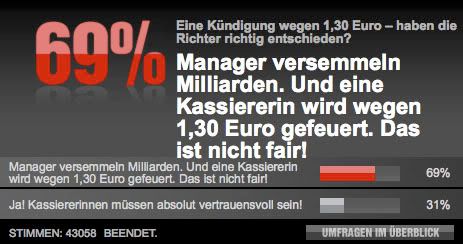She’s called Emmely; her real name is Barbara E. — with the family name omiited in line with legal practice here. All over Germany people are talking about her, most frequently with anger in their voices. For Emmely, a cashier in East Berlin, was fired by her discount store employer for allegedly filching 1.30 euro — less than one dollar. The boss insists that she took two coupons left by customers for the deposits on bottles and kept the money for herself. Emmely emphatically denies this charge. And the company — a chain of stores called Kaiser’s — cannot show any evidence against her. But it seems that they do not have to prove anything. According to age-old German law, the mere suspicion, if it violates their trust and confidence in an employee, is sufficient. They say that she took the money — barely enough for one subway ride — and that suspicion alone is enough cause to fire her. Emmely, who is 50, has worked in this store for 31 years. At her age the loss of a job, even without the added suspicion of stealing money, would condemn her to almost certain joblessness, with the resultant descent into poverty.
Emmely and her union feel certain there was a definite reason for the icy position of her bosses. Two years ago there was a brief strike in the company, which it was quickly able to put down. Emmely, one of the organizers, was the last one to give up in her demands for better working conditions. Most people are convinced that the bosses were waiting for a chance to take their revenge and frighten off any further rebelliousness. Many also believe they planted the alleged evidence against her.
Hello, you either have JavaScript turned off or an old version of Flash Player. Get the latest Flash player.
This kind of autocratic rule is nothing new in German discount stores, where working conditions are often intolerable, with long, late, and irregular hours at low pay, and where nearly every effort to form unions is stopped up short by all kinds of pressure. The trick with the alleged theft is not new by any means.
The employees at such stores are mostly women, often single mothers, and fearful of losing their jobs. A simple threat is usually sufficient to suppress any rebelliousness. If some employees are stubborn, they are often “suspected” of swiping a pack of cigarettes, a bottle of soda, or a small sum, as in Emmely’s case. And the companies have a corps of clever, well-paid lawyers just in case.
Emmely was more courageous than most and went to court. The judge decided in favor of Kaiser’s. So did the appeal court in Berlin. And that is when the pot boiled over and the case got national attention.
The economic crisis is hitting Germany harder every day. More and more people are being thrown out of work and, after a year of unemployment compensation, into a status resembling welfare in the USA or the dole in Britain, with minimum money, the enforced loss of all savings, insurance, items of any value, and, if above a certain seize, even their apartments. People are worried, fearful, and emotionally more involved than in the “better years.”
In addition, they cannot forget a whole series of scandals involving executives in huge companies who were either acquitted of their wrongdoings or got off with easily manageable fines and perhaps a sentence on immediate parole, which could only make them laugh. Siemens, the Deutsche Bank, Volkswagen, the partly-privatized postal and railroad systems — all faced scandals. Some top executives, most recently in the railroad system, were guilty of illegal spying on the personal affairs, conversations, and even bank accounts of all its employees. In every case the millionaires involved — even when they were convicted of bribery, tax evasion, misuse of funds, and other crimes — got away with murder and returned to their stylish ways of life. Emmely, on the other hand, was fired for the unproven theft of 1.30 Euros.
The anger in the land made some people think and even mention the words “class justice” — perhaps more often in the former East Germany and East Berlin than elsewhere. One leading politician, the Social Democrat Wolfgang Thierse, who now represents an East Berlin district, called the court decision “barbarous.” Immediately a swarm of indignant lawyers and jurists attacked him for his words. The judge involved had kept strictly to the law, they insisted. Thierse retreated and toned down his earlier angry vocabulary. Emmely, who broke down in tears after the decision, has decided to take her case up to the highest court in the land and is demanding a new law to prevent more trials like hers, in which the victim is considered guilty until she can prove her innocence — and often fired anyway.
Victor Grossman, American journalist and author, is a resident of East Berlin for many years. He is the author of Crossing the River: A Memoir of the American Left, the Cold War, and Life in East Germany (University of Massachusetts Press, 2003).

